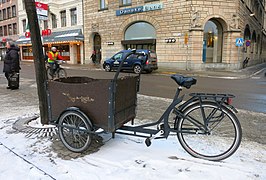Cargo bike
| Cargo bike | |
|---|---|
 Modern long-wheelbase cargo bike from Amsterdam | |
| Classification | Vehicle |
| Application | Transportation |
| Fuel source | Human-power, Motor-power |
| Wheels | 2–4 |
| Axles | 0–2 |
| Components | Frame, Wheels, Tires, Saddle, Handlebar, Pedals, Drivetrain, Cargo area |
| Examples | Butcher's bike, Porteur, Cycle truck, Boda-boda, Stroller bike, Long john, Off-road long john, Longtail, Wooden |
| Types | Bicycle, Tricycle, Quadracycle |
| Uses | Delivery services, Mail delivery, Transporting children, Food vending, Tool transport, Airport cargo handling, Recycling collection, Warehouse inventory transportation |
There have been many human powered vehicles designed and constructed specifically for transporting loads since their earliest appearance in the 20th century. They are referred to variously depending on the number of wheels — typically two, three, or four — and by their specific use. Adjectives used to describe the tasks to which the bicycles, dicycles, tricycles, or quadracycles are put include cargo cycles (bi- / tri- / etc.), freight cycles, box cycles (due to the luggage carrier's shape), carrier cycles, and so on. Sometimes they are also called cycletrucks, which uses a sense of the word 'truck' predating the automobile.
Cargo bike designs include a cargo area consisting of an open or enclosed box, a flat platform, or a wire basket, usually mounted over one or both wheels, low behind the front wheel, or between parallel wheels at either the front or rear of the vehicle. The frame, drivetrain and wheels must be constructed to handle loads larger than those on an ordinary bicycle.
Development
-
A modern cargo trike in use in London, featuring electric assist
-
Mother with two children in The Hague (Netherlands)
The first cargo bikes were used by tradesmen to deliver mail, bread and milk amongst other things. Early cargo bikes were heavy-duty standard bicycles, with heavy carriers at front or rear, sometimes with a smaller front wheel to accommodate a large front carrier. During the early part of the 20th century these were commonly used by tradesmen for local deliveries. In the UK this style is still sometimes known as a butcher's bike or delibike, although the Post Office have by far the largest fleet.[citation needed]
With the domination of the internal combustion engine in the industrialized countries after World War II, cargo bikes became less popular. In the rest of the world, however, they continued to be manufactured and heavily used.[1] In the 2000s, ecologically minded designers and small-scale manufacturers initiated a revival of the cargo bike manufacturing sector.[2]
Some cargo bike makers and users use power assist motors to complement the power of the cyclist. Power assist can increase the payload and range of cargo bikes, but also increases the cost of the bicycle and requires an on-board battery.[3]
Common uses
Cargo bikes are used in a variety of settings:
- Delivery services in dense urban environments
- Transporting children
- Food vending in high foot traffic areas (including specialist ice cream bikes)
- Transporting trade tools, including around large installations such as power stations and CERN
- Airport cargo handling
- Recycling collections
- Warehouse inventory transportation
- Mail delivery (The UK post office operates a fleet of 33,000 bicycles, mainly the Pashley MailStar)[citation needed]
Types

In Amsterdam and Copenhagen, cargo bikes are extremely popular.[citation needed] In Amsterdam many residents simply fit large front carriers to sturdy city bicycles. There is also a broad variety of specially made cargo bikes including low-loading two-wheelers with extended wheelbases, bicycles with small front wheels to fit huge front carriers, tadpole-type three-wheelers with a box between the two front wheels. Other varieties include a platform, basket etc. instead of the box, the loading area between two rear wheels (delta-fashion), small-wheel two-wheelers loading both back and front. An occasional four-wheeler can also be seen, especially within a plant, warehouse or the like, where demands on stability and loading capacity are higher than on range.
Many models are now available with an electric assist which can make them more useful for longer distances or for varied terrain, i.e. not flat cities, amongst other reasons, such as feeling more confident riding in car traffic due to faster acceleration from stopping.
Butcher's bike

Also referred to as a Baker's bike, although this style of cargo bike was popular with a wide variety of trades during the first half of the 20th century, particularly in the United Kingdom. Typically, they would have a basket or storage box mounted within a framework which was fixed to the frame (not the forks) of the bike. Often, they would also feature a sign advertising the business concerned, which would be attached within the main triangle of the bicycle frame.[4]
The Schwinn Cycle Truck, produced in the USA between 1939 and 1967, also employed the same basket to frame arrangement.[5]
Porteur bicycle

A porteur bicycle has the rack on the front, and can carry as much as 50 kg (110 lb) that way.
Cycle truck
The cycle truck refers to a type of cargo bike with a smaller front wheel than rear, typically 66 cm (26 in) rear and 51 cm (20 in) front.
Boda-boda
A boda-boda (or bodaboda) is a two-wheeled bicycle or motorcycle taxi, originally in East Africa. Boda Boda[6] is also the name of Yuba Bicycles compact cargo bike introduced in 2012.
Stroller bike
A cargo bicycle that converts into a stroller. Three wheels are used when the bike is in a stroller configuration, and two wheels are used when it is in a bike configuration with the cargo in front of the cyclist. This cargo bike can carry up to 100 lbs (45.4 kg).[7] The stroller bike won the Gold Award at the Eurobike exhibition in 2018 as a special-purpose bike.[8]
Long john bicycle

The long john bicycle is a cargo bike with the cargo area in front of the rider and some linkage connecting the steering to the front wheel, "linkage steering". Capacity is usually about 100 kg (220 lb). A traditional long john will have a smaller front wheel and a 58 or 66 cm (23 or 26 in) rear wheel, plus a 76–102 cm (30–40 in) long platform, basket, or box located low, in front of the handlebars.
The term "bakfiets" (which literally means "box bike" in Dutch; plural is "bakfietsen") is the Dutch word for cargo bikes in general. Bakfiets has traditionally mainly been used to refer to cargo tricycles with two front wheels,[9] while the term Deense bakfiets ("Danish cargo bike") is sometimes used to describe the Long John style of bicycle.[10]
Vintage long johns are becoming collectible.[according to whom?] The last known manufacturer to still produce the original[clarification needed] long john is Monark. The history of long john bicycles is traced to Denmark c. 1923.[11] The Smith & Co. Company (SCO - founded by Ivar Smith and Robert Jacobsen in Odense, Denmark 17 October 1894) was the inventor and the first to build this type of cargo bicycle. The first Long-John was presented to the public at the Wembley World Fair & Exhibition in 1924.
This style of bicycle is useful for carrying cargo, including children, and can function as a car replacement for many families.[12] It is possible to install a carseat in the box to for babies, and when children get older, they are often seated on a small bench and clipped in with a 3- or 5-point harness. Canopies can be affixed to the cargo box for protection from the elements, making a warm and inviting space for children to enjoy the ride.

Longtail bicycle

Longtails have a longer frame wheelbase at the rear compared to a standard bicycle.[13][14][15] The extended rear facilitates use as a cargo bike or carrying multiple or adult passengers compared with shorter bicycles. They tend to handle more like regular bikes than cargo bikes with linkage steering.

Xtracycle developed their first longtail product, their Free Radical,[16] which attaches to an existing 'donor' bicycle to make it a longtail bike in 1998. The growing popularity of Xtracycle inspired the Kona Ute,[17] launched for the 2008 season. Surly were asked by Xtracycle to build a complete Xtracycle-compatible frameset; the result was the 'Big Dummy', first released for the 2008 season. The chromoly frameset is designed for 660 mm (26 in) wheels.[18] Buyers have the choice of frameset alone or complete bicycle. In 2008 Xtracycle documented the LongTail as an open-source standard.[19] This has helped individuals to build longtail bikes themselves such as the Xtravois.[20][promotion?]
There is a sub-class of longtail bicycles referred to as midtails. As their name implies, they are not quite as long as a longtail, but can still often carry at least one if not two children. The distinction between both is not clear and there are longer tailed bikes sold as midtail, while shorter are categorized as longtail.
Wooden cargo bike

The chukudu (or chikudu, cbokoudou) is a two-wheeled vehicle similar to a scooter used in the east of the Democratic Republic of Congo. It is made of wood, and used for transporting cargo.
Tricycle

Cycle rickshaws and other cargo tricycles are used for short range transport of both people and goods while tricycles with boxes or platforms are used to transport goods. A cargo tricycle with an open or flat platform might be used for low value goods or for trips where the rider is always with the goods. A fabric cover can be added to provide weather protection. Tricycles can also be fitted with a lockable weatherproof box, usually of aluminium construction, for valuable goods and where the rider has to leave the vehicle.
Cargo tricycles can typically carry 100–300 kilograms (220–660 lb) of cargo and have capacity of 1 m3 (35 cu ft) or more, which is about half the capacity of a small panel van. The weight capacity of tricycles is limited by available human power and the permitted power of electric assist by law.
Gallery
-
A loaded cargo trike being pushed in Jakarta, Indonesia
-
Cyclists in Portland, Oregon, move a household by bike
-
Heavy-duty city bike with frame-mounted front carrier known as a "semi-transportfiets" (Dutch for semi-transport bicycle)
-
Classic Monark Swedish baker's bike, this one with locking aluminium case on the frame-mounted front carrier
-
Traditional Delibike in Buenos Aires.
-
Somewhat heavier bike, steered by linkage. Amsterdam, Netherlands.
-
Cargo trike specially equipped for street cleaning crews; The side and rear compartments carry pick-up sticks, bag holders and other gear.
-
Child transport is a popular use of cargo bikes, and numerous special models are offered.
-
Brazilian cargo bikes are very strong[citation needed] and commonly carry large propane containers, 5×75-litre water jugs, etc.
-
Heavy duty cargo trike in Sweden
-
An Iceni Cycles Chariot trike with aluminium box for local delivery work.
-
A Bike43 longtail ebike carrying two children
-
Chinese Cargo Bicycle
-
Traditional Dutch cargo tricycle
See also
- Bicycle trailer
- Electric bicycle
- Human-powered transport
- Outline of cycling
- Quadracycle (human-powered vehicle)
References
- ^ "Cargo Bikes: A Complete Guide for the USA and Canada". Momentum Mag. 2015-12-17. Retrieved 2022-04-14.
- ^ "A Visual History of Cargo Bikes". 22 October 2019.
- ^ Giddings, Morgan. "A Quiet Revolution in Bicycles: Recapturing a Role as Utilitarian People-Movers (Part II)". PeakProsperity. Archived from the original on 3 August 2012. Retrieved 15 April 2020.
- ^ "Museum of Tradesman's Delivery Bikes | Tradesmen's Delivery Bikes, Butcher's Bicycles, Baker's Cycles, Carrier Bicycles, Cargo Bikes, Freight Bikes…". Tradesmansbike.wordpress.com. 2009-07-07. Retrieved 2022-04-14.
- ^ "The Schwinn Cycle Truck | 1939 to 1967".
- ^ http://yubabikes.com/cargo-bikes/boda-boda/ [bare URL image file]
- ^ "Wike Electric Cargo Bike and Stroller". ebikes international. Retrieved 2022-06-10.
- ^ "Wike Salamander Cycle Stroller". Eurobike. Retrieved 2022-06-10.
- ^ "Short history of the cargo bike". International Cargo Bike Festival. Retrieved 2024-04-12.
- ^ Walker, Amy, ed. (2011). On Bicycles: 50 Ways The New Bicycle Culture Can Change Your Life. Novato/California: New World Library. pp. 127, 128. ISBN 9781608680221.
- ^ Dickson, Thomas (2006). Dansk Design. Copenhagen: Gyldendalske Boghandel. p. 392. ISBN 9781741963175.
- ^ "Biking With Babies". This Mom Bikes. March 28, 2018.
- ^ "Blog Archive » Longtail Vanilla #1". Clever Cycles. 2006-10-04. Retrieved 2011-04-23.
- ^ Dave R. (January 10, 2008). "Kona Ute—Rock solid cargo bike". Bike Hugger. Retrieved 2011-04-23.
- ^ Justin Thomas. "The Best Cargo Carrying Bikes Of 2009: A Review >> MetaEfficient Review". Metaefficient.com. Retrieved 2011-04-23.
- ^ "Xtracycle". Xtracycle. Archived from the original on 2014-12-30. Retrieved 2014-12-30.
- ^ "konaworld". konaworld. Archived from the original on 2011-03-03. Retrieved 2011-04-23.
- ^ "Spew | Removing and applying decals on our frames". Surlybikes.com. Retrieved 2011-04-23.
- ^ "Main Page - Open Source LongTail Technology". Xtracycle.com. 2009-03-13. Archived from the original on 2011-12-02. Retrieved 2011-04-23.
- ^ "xtravois". Clevercycles.com. Archived from the original on 2018-12-11. Retrieved 2011-04-23.
External links
 Media related to Freight bicycles at Wikimedia Commons
Media related to Freight bicycles at Wikimedia Commons



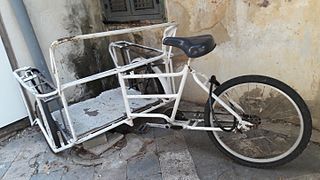
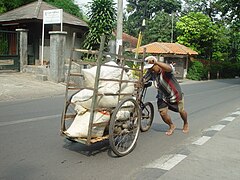
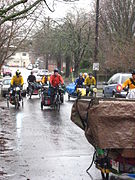
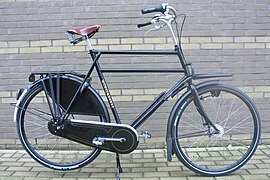
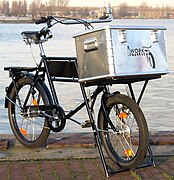
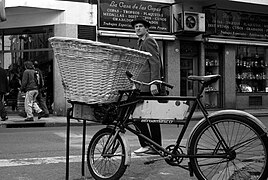

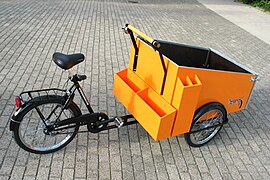
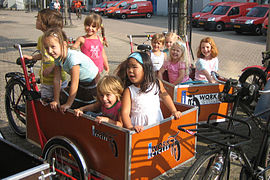
![Brazilian cargo bikes are very strong[citation needed] and commonly carry large propane containers, 5×75-litre water jugs, etc.](/upwiki/wikipedia/commons/thumb/b/b6/BrazilianCargoBike.JPG/240px-BrazilianCargoBike.JPG)
